- Home
- Roger Smith
Dust Devils Page 10
Dust Devils Read online
Page 10
His father walked toward him, holding out a smeared tooth glass of water. Dell took it and drank it back in one draft. Put the glass down on the cement floor beside the empty bottle of Jack Daniel's.
Goodbread said, "You hit that bottle like you bore it a grudge."
"We need to talk." Dell's voice like sandpaper in his throat.
"Sure we do. But first I need to take me a shower. It's in the building next door. I'll walk you there when I'm done. Meanwhile, I'm going to ask you to kindly keep the drapes shut and stay away from the window. I don't want the laborers to see you."
Dell nodded. The old man went toward the door carrying a skinny towel and a bar of soap. Like a prisoner.
"I have to take a leak," Dell said.
"Piss in the sink." Goodbread went out, shutting the squealing door.
Dell drilled a stream of urine into the plughole. Zipped himself and heard a soft knock on the metal door. Froze.
"It's me." The blonde woman's hoarse voice.
"Come in," he said.
The woman entered, bringing with her a momentary blast of hard daylight before she shut the door. She carried two plates covered with metal foil. A plastic shopping bag dangled from her arm. She set the plates down beside the sink.
"Your dad in the shower?" She wore no make-up this morning and she looked old and used up.
"Yes."
"I brought youse some breakfast." He could smell sausages and eggs. Made him want to puke. She took the bag from her arm and held it up. "There's some clothes in here. My husband's. He was about your size." Put the bag down on the sofa. "Don't worry, I washed them."
"Thank you," he said.
She looked at him. "How you feeling?"
"I'm okay."
"Those cops last night . . . Hope they didn't scare you?"
"I nearly shat myself," he said.
She laughed, showing yellow teeth. "Don't worry with them. They're useless. They know bugger all."
Dell nodded and sank down onto the bed. The old blonde sat on the sofa, unpacking the contents of the bag. Pants. Shirt. Underwear. A pair of heavy work shoes. She looked up at him through tired eyes. "I heard what happened. That the kaffirs killed your family."
There it was. The word that had defined his life as a white South African. Kaffir, from the Arabic kafir. Unbeliever. But taking on a whole new meaning in apartheid South Africa. Hate speech. Way worse than nigger, or coon or any of the others. Using the word branded you a white racist. Simple as that. Dell had got into countless fist fights with those who used it. Usually got the shit beat out of him, but still. And here he sat, saying nothing.
"They killed my husband too, you know?" The woman laid the khaki pants over the back of the sofa, picking a piece of lint from one leg. "He went up to the Free State, to his brother's farm, to help with the harvest. The kaffirs came with guns and shot him and his brother. Stole their truck. We buried the two of them on the same day. Cops did nothing. Just two white men dead. Just another farm murder."
"I'm sorry," Dell said.
She shrugged, moving a strand of dry yellow hair from her face. Got to her feet, wincing as a pain in her back caught her. "It's a war. No matter what they say. There's still some of us fighting." The woman walked to the door, limping slightly and turned to face Dell, a hand on the doorknob. "God bless you," she said.
A smile touched her thin lips, furrowed from years of smoking. She opened the door and stepped out in the light. Closed the door and he heard her feet crunching on the gravel as she walked away.
Sunday walked up the hill toward the hut, balancing a plastic water container on her head. The container was heavy, holding three gallons, but she moved with surefooted grace, only occasionally having to lift her hand to steady her burden. She had been down to the communal tap, twenty minutes away. Had to wait in line while the women filled their buckets and gourds. Listened with half an ear to their laments about taxi wars and sickness and poverty. Relieved when she heard the water drumming into her container.
With each step she took her mood lightened. Today was the day she would be free. Free of the aunt who had used her as a servant these last ten years. Free of the old dog who had bought her for his bed.
She passed three scrawny goats, legs grown uneven from having to cling to the slopes as they foraged for food. Made her think of her aunt who had suffered revenge after meddling in the affairs of a neighbor. The woman had paid a witchdoctor to curse Ma Beauty and her leg had withered almost overnight. Or so she said.
Today was the day Ma Beauty went down to Bhambatha's Rock, to collect her disability grant. Sunday had hoped she would already be gone, but when she saw smoke curling from the chimney of the hut she knew her aunt was still at home, making herself the thick brew of tea she drank every morning. Threw in stinking herbs and powders from her own witchdoctor, to protect her from evil spells.
Sunday would have to see Ma Beauty one last time. One last time. The three words made her smile as she looked out over the dry and torn valley. Tomorrow she would wake in Durban. By the ocean. She had never seen the ocean. Never been farther from here than Dundee, an hour's drive away.
Sunday felt a mix of terror and excitement. Especially when she thought of Sipho. She saw his long fingers on the wheel of the car, saw his smile. He looked so healthy. He'd told her he took medication, the pills the people of her area were so superstitious about, and ate clean food. Said that if a person was careful they could live to be old.
And he practiced what he called "safe sex". Had explained this to her earnestly, as he translated one of his pamphlets from English, showing her the pictures of the plastic things like balloons. She had felt her cheeks grow warm and she'd had to look away.
Sunday felt a confusion of feelings when she thought of him. Like she wanted to laugh and run and hide at the same time. She wondered whether he felt the same way about her. He sought her out, didn't he? Every time he was up from Durban.
As she neared the hut she told herself to stop being stupid. She wasn't running away with Sipho, he was helping her to escape from the old dog. That was all. She had to focus her mind. This was no time for daydreaming.
Sunday ducked into the hut and placed the water container on the floor. Her aunt sat huddled beside the fire, iron teapot bubbling.
"Morning, Ma," Sunday said.
The woman grunted, rubbing at her withered limb. "My leg it is paining. You must come with me to town."
Sunday felt a hollow space open up in her heart. "But Ma, I have to work."
Her aunt shook her head. "These are your last few days before your wedding. They will expect you to be busy."
"I need to get my pay." The only money she had. The money that would get her to Durban.
"Pick it up tomorrow."
"Please, Ma . . ."
The old woman grabbed the flesh of Sunday's leg, her bony fingers pinching like a scorpion. "You! Where do you think you are, girl? In the city? That you can disrespect an elder like so?"
Sunday stayed impassive. Refused to show pain.
Her aunt put a hand to the wall and pulled herself to her feet, breath coming in gasps. "Now hurry, you. I want to go early to town so I can buy myself shoes for your wedding." Looked down her nose at Sunday. "That a girl like you should be so fortunate I will never understand."
So Sunday walked her aunt down the hill, having to put up with her moans and muttered oaths, supporting her weight as they negotiated the rocky path. As they reached the road a minibus taxi pulled up, and a couple of women waiting on the red sand climbed inside. The co-driver stood with his hand on the sliding door, urging Sunday and her aunt to hurry, slamming the door closed after them.
Ma Beauty squeezed herself into a seat, making room for Sunday. The driver was already gunning the engine when Sunday sprang up and pulled the door open, jumped down onto the sand. Closed the door after her. Watched as the taxi took off, her aunt's monkey face – mouth shouting soundlessly – disappearing in the spray of dust.
&
nbsp; Sunday had never disobeyed the woman before and it left her feeling exhilarated as she ran back up the hill, sweating in the heat. She had an hour to pack her things and get down to the Zulu Kingdom. For her last performance.
Sunday stripped and washed herself. Dressed in her best white panties, ironed jeans and T-shirt. Then she packed all her belongings in a paper shopping bag. Another pair of jeans. Two T-shirts. Two panties. Her Zulu Bible. Placed the charred photo album on top of her clothes. Leaving behind her wind-up radio and her thin pile of dog-eared schoolbooks. She would have no use for them where she was going.
Sunday left the hut. She stood for a moment looking out across the valley toward where her family had been murdered. Saying goodbye. Then she walked down the hill.
Dell, wearing the dead man's clothes, was at the wheel of a white pickup. A Toyota double cab. Like a negative image of the truck that had smashed the Volvo over the cliff. He drove, his body on automatic. Willing the pain and grief away. Numbing himself. Each broken white line flashing by was a marker, taking him closer to the man who had killed his family.
His father sat at his side, a map spread across his knees, mumbling directions, the greenery giving way to flat semi-desert scrubland now they had crossed the mountains. Dell saw two brown kids running at the side of the road, waving at him, teeth shining, and he understood that his children would never reach that age. His knuckles turned white on the wheel and tears blurred the road until he wiped them away.
Back at the farm Goodbread had returned from the shower, wet hair sticking to his scalp. He'd checked that no laborers were in sight and he'd covered Dell's head with the blanket and taken him to the bathroom. Told him to shout when he was done.
The shower was as spartan as the room his father lived in. Unplastered cinderblock. No windows. A curtain smelling of mildew. A shower head that dribbled tepid brown water. It was the first time Dell had been in a shower since the morning of his birthday. Standing under the water, after he'd peeled away the bandage that bound his ribs, sluicing off the blood and the grime and the prison cells, made him feel closer to human.
He dressed in the khaki work pants, check shirt, and heavy brown work shoes. There was no mirror in the bathroom but he knew his transformation was complete. He looked like one of them. One of the white men he had spent his life fighting.
He shouted for his father and the old man covered his head again and led him back to the room. Dell shook the blanket off. "I'm not going to tell anybody where this place is."
Goodbread laughed. "That's what you say now."
"Meaning?"
"If we're captured they'll question you. And bet your ass they won't be polite. You'll tell them whatever they want to know, take that as gospel."
"And you won't?"
Shaking his head. "Reckon I've had more experience."
Dell sat down on the bed and stared at the old man. "I want you to be honest with me."
"About what?" Goodbread sat opposite him, on the sagging sofa.
"Why you're doing this."
"You're my son. They were going to kill you. I reckon I had but two choices: shut my eyes or get involved in your business."
"Bullshit," Dell said. "You're still fighting your old war, aren't you? You and that bunch." Pointing toward the house.
"My war is long over, boy."
"But you miss it, having a license to kill black men?"
"I have sent white, yellow, black and brown men, equally, to their reward. It was never the color of a man's skin that concerned me. It was the color of his politics." Goodbread fixed him with a stare. "That you chose to marry a dark-skinned woman and father a pair of mulattos never troubled me. But the fact that you embraced Marxism at a time when WW Three was a button push away, now that irked me mightily."
The old Goodbread in full flight. And it was too much for him. A coughing spasm shook him and he lifted himself from the sofa and went over to the faucet, drank water, fought for air. After a minute he composed himself and returned to his seat.
"What's wrong with you?" Dell asked.
"Had me a flu in the winter. Takes longer to shake when you're old." He lit a cigarette, hands trembling so badly he was in danger of killing the match. Sucked nicotine. Closed his eyes. Smothered a cough.
"Okay. Talk to me. What's your plan?" Dell said.
The old man opened his watery blue eyes. "It's real simple. We're going to take us a ride up to Zululand. Get our hands on Inja Mazibuko. Get him to confess to killing your family."
Dell stared at him. Shook his head. "You're fucking crazy."
"You got a better idea?"
"Yes. I call my lawyer. Get some media attention. Work this thing out."
Goodbread wheezed a laugh. "Oh, you've got their attention, boy, don't you worry. But there's one thing I know for damn sure . . ."
"And what's that?"
"Stick your head up and there's no way in hell you'll live long enough to talk to no media."
Dell tried to find an argument. Failed. "And you think we'll be able to capture Mazibuko?"
"Yessir, I do. He'll tap into his informer network. Ask questions. Get the answer that I've already put out into the wind: that we're across the Namibian border. He'll know damn well I have connections up there. Last place he'll expect to see us is in his own backyard."
"And if we capture him, what do we do?"
"I reckon that's when we call in your media."
Dell sat and watched his father smoke. Saw the tremor in his hand. "Level with me. What are our chances? An old man and a fucking pacifist?"
"You still calling yourself that after what they did to your kin?" Dell said nothing and Goodbread took a long drag on his cigarette, the ash flaming red. Then he shrugged and sighed smoke. "Well, could be they shoot us down like dogs long before we get there. Or maybe Mazibuko and his crew are sat waiting with their AKs hot and ready to go. Question is, do you want to die knowing you did nothing? I surely don't."
So Dell had let himself be led out to the truck, covered with the blanket until they were a half hour away from the farm. Then Goodbread had pulled over. Let Dell drive ever deeper into the brown landscape, the road unspooling ahead of them.
They rounded a curve and Dell saw three police vehicles parked on the shoulder, cops in day-glo vests standing in the road. The sparse traffic in front of their truck slowed. "Fuck."
"Easy," Goodbread said. "They're only pulling taxis over."
It was true. Dell could see a couple of minibuses at the roadside, the cops questioning the drivers. "What if they stop us?"
"They won't."
"You going to start shooting?"
Goodbread laughed. "Got nothing to shoot with, boy." Dell looked across at him. "Too risky to be on the road with unlicensed firearms this close to Cape Town."
They were up to the roadblock now. A brown cop wearing a bib with orange and lime green chevrons looked at them with sleepy eyes and waved them on. Dell accelerated, watching the cops shrink to nothing in his rearview.
"So, we're going after Mazibuko unarmed?"
His father spoke as he lit another cigarette, "We'll pick us up some ordnance on the way. Don't you fret about that." Sucking smoke.
"What makes you so sure he'll go home? Inja?"
"Because, boy, he's getting married this Saturday. Taking him a fourth wife, in the Zulu way. Already posted out the invites." Smiling like a skull, his old man's yellow teeth too big for his face. "Reckon he has a surprise wedding gift coming down the pike."
Inja's mood was as sour as his stomach. He stopped the rental Volkswagen near the wind farm, the giant propellers slicing the morning sun. He opened the door and shot a hot jet of puke onto the sand. Wiped the sweat from his brow, slugged back half a tin of lukewarm Coke. Burped. Finished the Coke and threw the can out. He had a map open on the seat beside him, directions scribbled on the page. He oriented himself and drove away.
Inja hadn't slept. He'd taken a taxi from the shack where he had eaten the sheep's
head to a cheap hotel near the airport. Then he had spent late into the night on his phone, the Motorola heating up his ear like he was sitting too close to a fire. Worked his way through his contacts in the police and the netherworld that linked cops and criminals like connective tissue.
Spoke to black men who had worked as cops during the apartheid era, who still lived in fear of reprisals for collaborating with the Boers and were eager to find favor with Inja and his all-powerful chief. Traitors who had links with the kind of people who would hide the white man and his father.
Finally, just after dawn – his throat dry from threatening and cajoling – Inja had been given an address. A farm two hours outside Cape Town where Goodbread had been seen. His informant telling him the local cops had checked the place out and found no sign of the escaped man. Local cops Inja wouldn't trust with a cow dead ten days.
As Inja followed the narrow asphalt road that carved its way through the unfamiliar green landscape his phone rang. He answered it, wedging it between shoulder and ear as he drove. He grunted a few times and hung up. Some good news. His men back in Zululand had taken revenge for the taxi that had been ambushed. Killed a rival driver the night before outside Bhambatha's Rock. The brother of an old enemy. Good news, yes. But he should be at home, commanding his troops. The situation needed his guiding hand.
Inja overshot the gate to the farm. Reversed, crashing through the gears, then set off up a rutted sand road, his guts banging up against his ribs. Puke rising again. He reached for a spliff in his top pocket. Fired it up and hit it hard. The drug settled his stomach. Slowed things down. Gave him time to steady himself for battle.
Inja saw black men out in the fields, small specks in overalls. A red tractor rattled in the distance. He approached the house, an old stone place with a porch. He stopped at the rear, sat with his doors closed and windows wound shut, waiting for the farm dogs that he knew would appear. And there they were: two ugly beasts. Jumping up against his door, yellow teeth snapping, jowls leaving spit smeared across the window glass. Trained by these whites to tear at his black flesh.

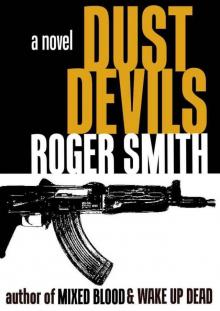 Dust Devils
Dust Devils![[2013] Sacrifices Read online](http://i1.bookreadfree.com/i/03/19/2013_sacrifices_preview.jpg) [2013] Sacrifices
[2013] Sacrifices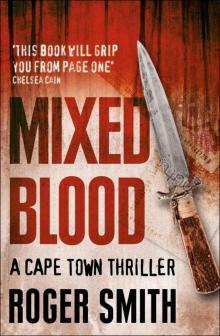 Mixed Blood
Mixed Blood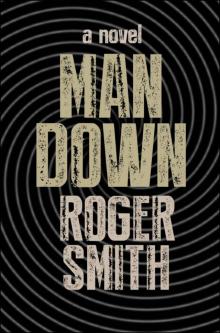 Man Down
Man Down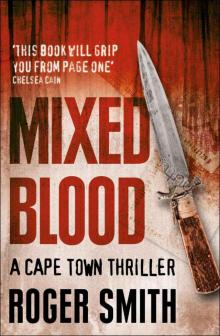 Mixed Blood ct-1
Mixed Blood ct-1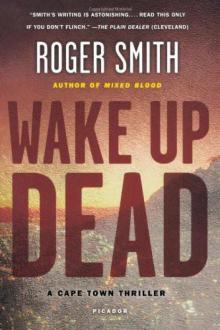 Wake Up Dead: A Thriller (Cape Town Thrillers)
Wake Up Dead: A Thriller (Cape Town Thrillers)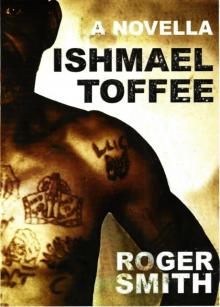 Ishmael Toffee
Ishmael Toffee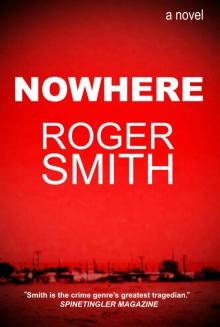 Nowhere
Nowhere Sacrifices
Sacrifices